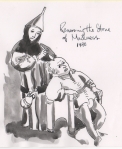By Dr David Laing Dawson
There it was again. The local paper reporting on homelessness, reporting on the results of a survey of over 400 homeless people in our city. All very nicely written and laid out. The number of homeless people who have been the victims of violence; the number who struggle with addictions. And the over 80% who suffer from “mental health issues.”
Dictionary definitions of the word ‘issue’ include:
“An important topic or problem for debate or discussion” – the operative portion of that definition being “for debate or discussion.”
Now I understand that how we describe or name something may shift and change over time, often for good reason, often not. We no longer use the word ‘retarded’ to describe someone who has less than average intellectual capacity. It is a word that accrued a lot of baggage through the years, and became a schoolyard epithet, implying, at least in the vernacular of teenagers, something like “willful stupidity”, or “in bad taste.”
But euphemisms often creep into our vocabulary to hide the truth, or to reduce the sting of truth. Sometimes the euphemisms are simply more polite (‘disability’ may become ‘special needs’); sometimes they are obfuscations with only a limited reference to the original activity, problem, or thing (‘illness’ becomes ‘issue’), and sometimes they are softer vague words chosen to hide the reality of the action or intention of our governments, bureaucrats, and military, and sometimes they are even, a la George Orwell, antonyms of the word that would actually reveal the truth.
I don’t know how the word ‘issue’ became the mot du jour, sometimes even added as a totally unnecessary noun. As in ‘he has addiction issues’ instead of ‘he is addicted’. I suspect it is related to the actual meaning of ‘issue’, (a topic open to debate), and by calling mental illness an issue we are placating the deniers of mental illness and we are reducing it to an abstraction, a topic for discussion and debate, rather than a reality in our midst, and often the actual cause of homelessness.
Even if, reasonably, we want to reserve the words ‘disease, illness, and disorder’ for only severe forms of this reality, this plight, we still have other words to chose from that do not imply a debatable abstract: ‘problem, difficulty, trouble, worry’. We might even say “mental health concerns, including mental illness”.
But let’s stop with the “issue” when we are naming or describing a painful reality.

I agree whole heartedly. To use this kind of soft language when speaking about mental illnesses is intended to cancel any thought that these chronic brain diseases are severe
diseases. The tax-funded Mental Health Commission, Canada is rife with the awkwardness of politically correct verbiage to prevent using language that implies serious brain diseases are medical diseases. For as semanticist Neil Postman says “if you change the names of things you change how people will regard them, and that is as good as changing the nature of the thing itself.”
It is group think. To create this common language is an attempt by anti psychiatric word-abusers. t is an attempt to put a stamp on serious brain diseases like schizophrenia, depression high anxiety and other neurological diseases that does not acknowledge their biological nature. It is politics brought into brain diseases.
And unsuspecting others have helped by using ‘issues’ instead of illnesses. I have attended meetings where it was decided that describing serious bran diseases “issues” is the kinder most thoughtful language. (The fact that it hides the true nature of mental illnesses is of no concern to word police.)
This blackwhite approach thinking is the ability to believe black is white and more to know black is white and forget one has ever believed the contrary.
LikeLiked by 1 person
Yes it about time some of the camouflage words are debunked. Polite straightforward truthful words enable appropriate healthcare to be afforded to those who need them .
LikeLiked by 1 person
I so wish I could disagree with something you say in your posts Dr Dawson! Then we would have an issue would we not lol. As always an accurate portrayal that is logical, truth filled, bold and unconventional to the extent of being a worshipful sermon. Together with ‘issue’ is the bedfellow obfuscation ‘behavioural’; used by ‘clinicians’ to minimise responsibility for interventions that are non existent.
LikeLiked by 1 person
Issue sounds like someone “can’t handle life.”
When someone uses the term “issues” it perpetuates stigma. The myth that if you just pull yourself up with your bootstraps you’ll be fine.
Through education and sharing our personal stories–we will help others to realize it truly is a medical illness and deserves to be treated as such.
VisionforChange.net
LikeLike